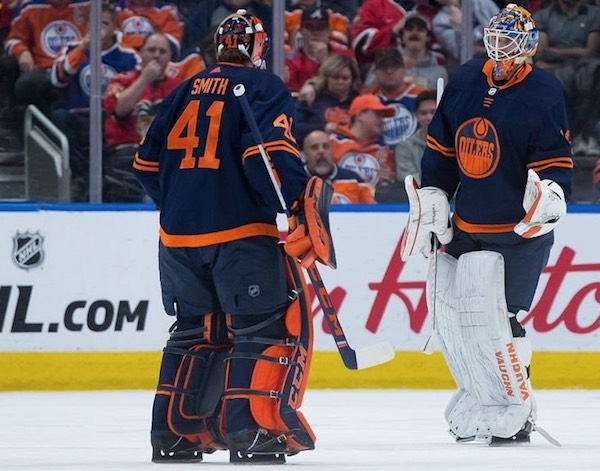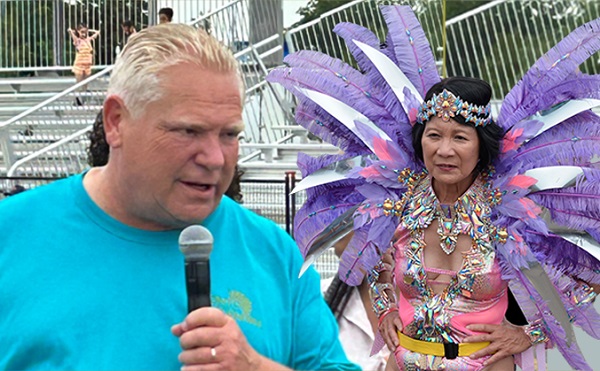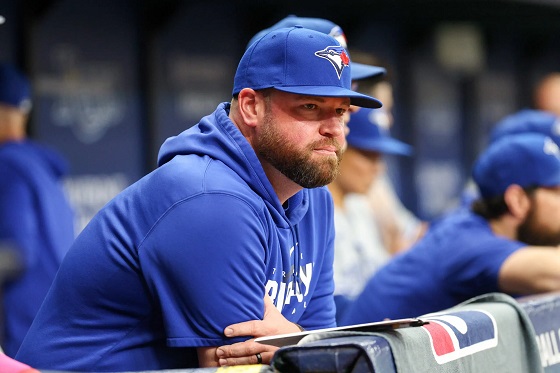Bruce Dowbiggin
For Want Of A Goalie Leafs & Oilers Take A Net Loss

There are truisms. Never eat at a place called Mom’s. Never play cards with a guy whose name is the same as a president. And don’t try to fake goaltending in hockey.
Everyone knows that. Except, apparently the Toronto Maple Leafs and the Edmonton Oilers— both teams that entered the year as bonafide Stanley Cup threats. The Maple Leafs in particular were considered a Top 5 NHL team. Loaded with stars such as Austen Matthews, Mitch Marner, William Nylander and John Tavares, they were seen as a powerhouse in the Eastern Conference
In the West it was supposed to be the year Connor McDavid and Leon Draisaitl would finally lead the Edmonton Oilers to a lengthy playoff run. Both these predictions hinged on the ability of the clubs to locate a consistent goalie— or goalie tandem— to backstop their high-octane offences.
But for reasons best known to themselves the suits in Toronto and Edmonton chose to use the devils they knew as opposed to the devils they might obtain in a trade or a signing. The Leafs have been using a combo of journeymen Jack Campbell, Erik Kallgren and Peter Mrazek this season. The result has not been disastrous, but no one in Toronto thinks it can work in the playoffs. And who wants to see another year come off the calendar for the Leafs’ core?
Hence the Hogtown shock when GM Kyle Dubas was unable to come up with a goalie like Marc-André Fleury or Jake Allen at the trade deadline. With so much invested in the Leafs star-studded lineup it seems a huge gamble to leave things to chance. After losing to the awful Montreal Canadiens on Saturday but beating Florida on Sunday the Leafs are now just above a wild-card spot, third in the division and sixth in the conference.

There’s no likely prospect of missing the playoffs, but playing road games against either defending Cup champs Tampa or the resurgent Panthers in the first round would be daunting. (Although Florida’s proved little bother on Sunday.) If the season ended now the first-round opponent would be Tampa.
Then there are there perennially disappointing Edmonton Oilers. Like Toronto the Oilers braintrust tried to make goalie salad out of the goalie scratch from ancient Mike Smith and untested Mikko Koskinen at season’s debut. When that formula soured they fired coach Dave Tippett for Jay “Who ‘Dat” Woodcroft.
But Woodcroft can’t get the goaltending right, either. Like Toronto the Oil also came up dry on a replacement at the trade deadline. All you need to know about how that goalie tandem has worked out was on display in Calgary’s 9-5 rout of the Oilers’ goalies. The Flames scored at will as their fans gleefully chanted “We want 10!”
Unlike Toronto, the Oilers could tumble out of the playoffs altogether. For now they would face the L.A. Kings if the playoffs begin this week. Making it all the more galling for the Oilers is the stunning performance of the Flames, their Alberta rivals. Backstopped by Vezina candidate Jacob Markstrom, the free-wheeling Flames are suddenly the darlings of bettors to win the West and maybe the first Canadian team to win the Stanley Cup since 1993.
Seeing them carve up the two Edmonton goalies was extra galling. The Montreal Canadians of 2021 showed that almost anyone can get on a run with a hot goalie like Carey Price. This year’s worst Eastern Conference club made it all the way to last year’s Final before succumbing to Tampa. But the chances of the Leafs or Oilers making the same push with the spares they have in goal are very long.
Which brings up a topic we first wrote about in January 2018 in How Long Will Connor McDavid Stay With A Loser? While Toronto’s large market can provide Matthews with lots of brand exposure, the same can’t said for McDavid in Edmonton. The biggest issue is how long McDavid wants to sequester himself in northern Alberta, far from the marketing opportunities of the NHL’s large markets, rarely seeing the postseason. (By contrast, Gretzky never missed the postseason in his 14 NHL seasons.) Yes, he has a whacking great contract. Yes, he’s making all the right noises about loving Edmonton.
But in the age of Lebron James organizing his own NBA teams, MLB powerhouses buying what they want, the notion that McDavid is wedded to a floundering small market in perpetuity is wishful thinking for Edmonton fans. It says here, there’s a clock ticking on the Oilers’ monopoly on McDavid’s affections. If he can’t realize his brilliant skill in Edmonton it will be somewhere else. And sooner than you might think.
That was four years ago. Seeing the Oilers yet again deny him the goalie that might bring him a Cup is getting very old. So is the Leafs fumbling toward irrelevancy, because the team with everything can’t get a goalie. Teams have a window for success. Both Edmonton and Toronto have less runway left now. To paraphrase Shakespeare, for want of a goalie the Cup was lost.
Bruce Dowbiggin @dowbboy is the editor of Not The Public Broadcaster (http://www.notthepublicbroadcaster.com). The best-selling author was nominated for the BBN Business Book award of 2020 for Personal Account with Tony Comper. A two-time winner of the Gemini Award as Canada’s top television sports broadcaster, he’s also a regular contributor to Sirius XM Canada Talks Ch. 167. His new book with his son Evan Inexact Science: The Six Most Compelling Draft Years In NHL History is now available on http://brucedowbigginbooks.ca/book-personalaccount.aspx
Bruce Dowbiggin
DEI Or Die: Out With Remembrance, In With Replacement

“Thank you to those so often forgotten by the politics of our city who made this movement their own. I speak of Yemeni Bodega owners and Mexican abuelas, Senegalese taxi drivers and Uzbek nurses, Trinidadian line cooks and Ethiopian aunties”.- new NYC mayor Zohran Mamdami
The new mayor’s effusive tribute to immigrants is very on-brand for the Woke Left. Coming as it did on the week where Canadians’ remembered the sacrifice of the over one hundred thousand who “died to make the world free” in WWI, WWII and Korea— even as their homes are squeezed between hereditary land rights and Justin Trudeau’s holiday camp.
For Boomers that battle sacrifice has underpinned their lifestyle for most of the past 75 years or so. No matter how cynical or hipster the Boomer, the phrase “They died to make the world free” was the Gorilla Glue holding Western civilizations together. Whether you agreed or not, you acknowledged its pre-eminence in society.
Those who annually recall family members who’d made the ultimate sacrifice underscore that “they died to make the world free” is foundational in their national myth making. For example, our younger son placed roses on my uncle’s grave in the Commonwealth war cemetery near Hanover, Germany. He then delivered the petals to his grandmother to acknowledge the loss of her brother.

These rituals of sacrifice were everywhere till the early decades of the twenty-first century when the demographics of declining birth rates in the West combined with aggressive immigration— both sanctioned and illegal— to create the Beirut described by mayor Mandami upon election. He was talking about NYC, but it could have been Toronto, Montreal or Vancouver. But you are free to ask what freedom means in this context.
North America in particular has long encouraged immigration. It was typically combined with assimilation in the doctrines used by governments of the day. People from around the globe arrived in the West and aspired to the cultural and financial modes they discovered. For one young Ukrainian boy we knew the figure of Frank Mahovlich, son of Croatian immigrants, on the Toronto Maple Leafs was proof that he could belong in his new society.
But somewhere along the way the suicidal empathy of progressives— combined with a need for low-income workers for corporations— loosened the expectations for those arriving in the West. In Canada, prime minster Justin Trudeau adopted Yan Martel’s diversity model of Canada as a travellers’ hotel. No longer would newcomers need to assimilate.
They could live side-by-side with ancestors of original inhabitants while still recreating their former homelands. In time the bureaucracy— and revenge of the cradle— would replace the cranky white people with a more malleable electorate. It was Replacement Theory.
The Canadian boys going over the top at Vimy or taking off in their Lancaster bombers would never have foreseen this as they risked their lives. They couldn’t countenance the people they’d fought for throwing away their sacrifice on a pandering scheme like DEI (diversity, equality, inclusion) which replaced merit with settler guilt in hiring decisions.
When government admonitions to accept their societal revolution failed to produce enough newcomer guilt, social media filled the gap. Remember the drowned Syrian boy on the beach in 2015? The uproar about Canada’s immigration policies helped unseat Steven Harper and install a trust-fund puppet in the PMO. And it opened the floodgates that sent Canada from 35 million to 42.5 population in a decade.
As Mark Steyn observes, “Winston Churchill said we shall fight them on the beaches; his grandson Rupert Soames set up the highly lucrative business model whereby we welcome them on the beaches …and then usher them to taxpayer-funded four-star hotels with three meals a day and complimentary cellphone. That’s the story of the post-war west in three generations of one family.”
Recent reports show that many top American corporations are moving away from DEI back to merit-based hiring. But Canada’s government, led by its Woke academic and culture sectors, remains stubbornly fixed on the DEI model. That obsession keeps the corporate side from emulating their American counterparts.
The tell that DEI is far from dead can be seen in how the advertising world has doubled down on the orthodoxy of majority male whites bad/ everyone else good. In what is clearly a political, not profitable approach, minorities, mixed-race couples and women are featured in commercials in numbers far disproportionate to their percentage of the population.
A blend of LGBTQ and Rousseau’s The Noble Savage has produced The Church Lady come to the 2020s. Upper-class blacks are portrayed as authority figures while white males are hillbilly figures of ridicule. This is not to placate those communities but to assuage the guilt felt by educated white liberals.
Mixed-race commercials now mandate that virtually no same-race figures be allowed to be paired on-camera. (Having the ironic effect of white liberals telling the minorities they worship that they are not worthwhile unless in combination with the evil settler demographic.)

It’s the same in movies and TV which used to complain about cultural appropriation but now suddenly place racial and gender-inappropriate actors in period roles that are clearly specific to whites and males. For example, Netflix’s new series Death by Lightning is set in Chicago, 1880 – and this foreground establishing scene pops up.:
•an Asian woman,
•two Black men,
•and a one-legged man
-
all walking together. @StutteringCraig estimates the odds of this DEI dream at roughly 1 in 640,000. No matter. Authenticity is so yesterday.
The DEI obsession has pilled over into traditional Remembrance Day ceremonies that were marred by land acknowledgements and slavery references (slavery was banned in Canada 45 years before it became a nation.) Which led to CBC running a story on the Palestinian flag being raised at Toronto city hall on Remembrance Day.
In B.C. premier David Eby has declared that Canada now needs a power-sharing with the Cowichan and their confederates. American politics is also loath to give up their DEI dogma. In one real-life example leftist radio host Stephanie Miller kissed the feet of unhinged Democrat Rep. Jasmine Crockett. “Why, yes I DID kiss the sneakers of @JasmineForUS and I DO worship the ground she walks on! And she was LOVELY about it!” The laces fetishists think this performative theatre will always be thus. It won’t.

“The Venetian Republic lasted 1,100 years – and ninety-nine per cent of North Americans have never heard of it. But, on present demographic and fiscal trends, that’s four times longer than the United States is likely to make it,” Steyn observes.
“Walk around New York: The Yemeni-Mexican-Senegalese-Uzbek-Trinidadian-Ethiopians are the future. And you’re not.”
Bruce Dowbiggin @dowbboy is the editor of Not The Public Broadcaster A two-time winner of the Gemini Award as Canada’s top television sports broadcaster, his new book Deal With It: The Trades That Stunned The NHL And Changed hockey is now available on Amazon. Inexact Science: The Six Most Compelling Draft Years In NHL History, his previous book with his son Evan, was voted the seventh-best professional hockey book of all time by bookauthority.org . His 2004 book Money Players was voted sixth best on the same list, and is available via brucedowbigginbooks.ca.
Bruce Dowbiggin
Maintenance Mania: Since When Did Pro Athletes Get So Fragile?

The Los Angeles Dodgers’ Game 7 win in the World Series over the Toronto Blue Jays averaged a combined 27.3 million viewers. By comparison, the 2025 NBA Finals’ Game 7 between the Oklahoma City Thunder and Indiana Pacers averaged 16.4 million viewers on ABC.
Granted, the MLB had the L.A. market as backstop while the NBA featured two small-market teams. But there was no second U.S. home market in the numbers, because Toronto doesn’t count in U.S. ratings. BTW: Canadian ratings were spectacular with over 18.5 million viewers watching some or all of Game 7.
For those who thought baseball was dead as a TV property, 2025 was a golden throwback to another age. Likewise, the NBA Final— with its Canadian MVP—was a flashback to the days when pro basketball played second fiddle to college basketball.
What’s wrong with pro basketball? Many think tying itself so closely with the DEI network ESPN has put off many. The obsession with the L.A. Lakers is off-putting, too. Betting scandals don’t help. But more than anything the NBA is tainted by its stars taking “maintenance days” off for R&R in the middle of the season.
Fans who purchase tickets when the schedule is announced to see LeBron James or Zion Williamson have no recourse months later when the coach sits a player on those maintenance nights. TV schedulers also see their feature primetime games blown up. According to surveys, 65 percent of fans express disappointment when they attend a game without the expected stars.
The trend really caught wind when Kawhi Leonard, with the Toronto Raptors over a barrel, took frequent maintenance days on his way to the 2019 NBA title. Leonard supporters might say that the Raptors beat a battered Golden State Warriors team missing numerous starters like Kevin Durant and Draymond Green whose injuries sidelined them for the Final.

Maybe. (Leonard continues his maintenance routine with the L.A. Clippers.) But the wholesale use of maintenance days during the season has fans asking, Are today’s players more vulnerable to the stresses of a long season or were the players of the Michael Jordan era just mentally tougher?
Just look at Jordan’s record from 1985 to 2003. In an era where there were no private jets, no personal chefs, no advanced sports medicine, Air Jordan flew all 82 games/missions nine times in his career. In fact, outside the two years he played baseball or there was a labour disruption, he played 78 or fewer games just once. This with the Detroit Pistons Bad Boys hammering him.
In defence of today’s stars, the more compact schedule has resulted in an almost 25 percent increase in injuries. The bar for athletic achievement— height, speed, recovery— has gone a lot higher. And the players have to protect the phenomenal salaries they now draw versus Jordan’s day.
Still. There is caution and then there is indulgence. Coaches in danger of losing their job are subject to taking a knee when their stars tap out for a game. The NBA knows its fans were not onboard with the practice, as the TV ratings show.
What about maintenance in other sports? It was a big issue throughout the baseball season— in particular the playoffs. Managers and pitching coaches doing strategy by pitch count. In the ALCS and World Series, a cautious Blue Jays manger John Schneider yanked starters Kevin Gausman, Trey Yesavage and Max Scherzer with seemingly more pitches in their arm to bring in mediocre bullpen pitchers.
Schneider blew Game 5 of the Series with some wonky pitch-count decisions. But, in the end, it worked out for Schneider as he finally threw caution to the wind in the final games versus the Dodgers, using his starters from the bullpen and allowing more elevated pitch counts.

Not so much success for Detroit manager A.J. Hinch who yanked his ace Tarik Skubal, up 2-1, after 99 pitches in the final ALDS game against Seattle. His bullpen then blew the game in 15 torturous innings. Surely Hinch could get more from Skubal. In his day Nolan Ryan would throw 125-140 pitches in games. But Hinch was protecting the arm of his ace, who might just be traded or sign with another team in the next 12 months.
This protection racket has introduced a news strategy of running up pitch counts in at-bats against excellent pitchers early in a game so the hitters can get to the bullpens when the starters hit the magic pitch count. Managers are now having to bring in their stoppers in the sixth or seventh inning if the lead is getting away from them.
Fans, meanwhile, are confused why today’s pampered stars still tear up their arms, needing Tommy John elbow surgery despite the lowered innings. counts. Meanwhile everyday players never get tired?
So don’t be surprised when your fans turn off the TV because they see stars prioritizing their salaries over win/ loss.
Bruce Dowbiggin @dowbboy is the editor of Not The Public Broadcaster A two-time winner of the Gemini Award as Canada’s top television sports broadcaster, his new book Deal With It: The Trades That Stunned The NHL And Changed hockey is now available on Amazon. Inexact Science: The Six Most Compelling Draft Years In NHL History, his previous book with his son Evan, was voted the seventh-best professional hockey book of all time by bookauthority.org . His 2004 book Money Players was voted sixth best on the same list, and is available via brucedowbigginbooks.ca.
-

 Business2 days ago
Business2 days agoMark Carney Seeks to Replace Fiscal Watchdog with Loyal Lapdog
-

 Business2 days ago
Business2 days agoP.E.I. Moves to Open IRAC Files, Forcing Land Regulator to Publish Reports After The Bureau’s Investigation
-

 COVID-192 days ago
COVID-192 days agoMajor new studies link COVID shots to kidney disease, respiratory problems
-

 Addictions17 hours ago
Addictions17 hours agoCanadian gov’t not stopping drug injection sites from being set up near schools, daycares
-

 International1 day ago
International1 day agoIs America drifting toward civil war? Joe Rogan thinks so
-

 Business17 hours ago
Business17 hours agoParliamentary Budget Officer begs Carney to cut back on spending
-

 International1 day ago
International1 day agoBondi and Patel deliver explosive “Clinton Corruption Files” to Congress
-

 International1 day ago
International1 day agoUS announces Operation Southern Spear, targeting narco-terrorists









